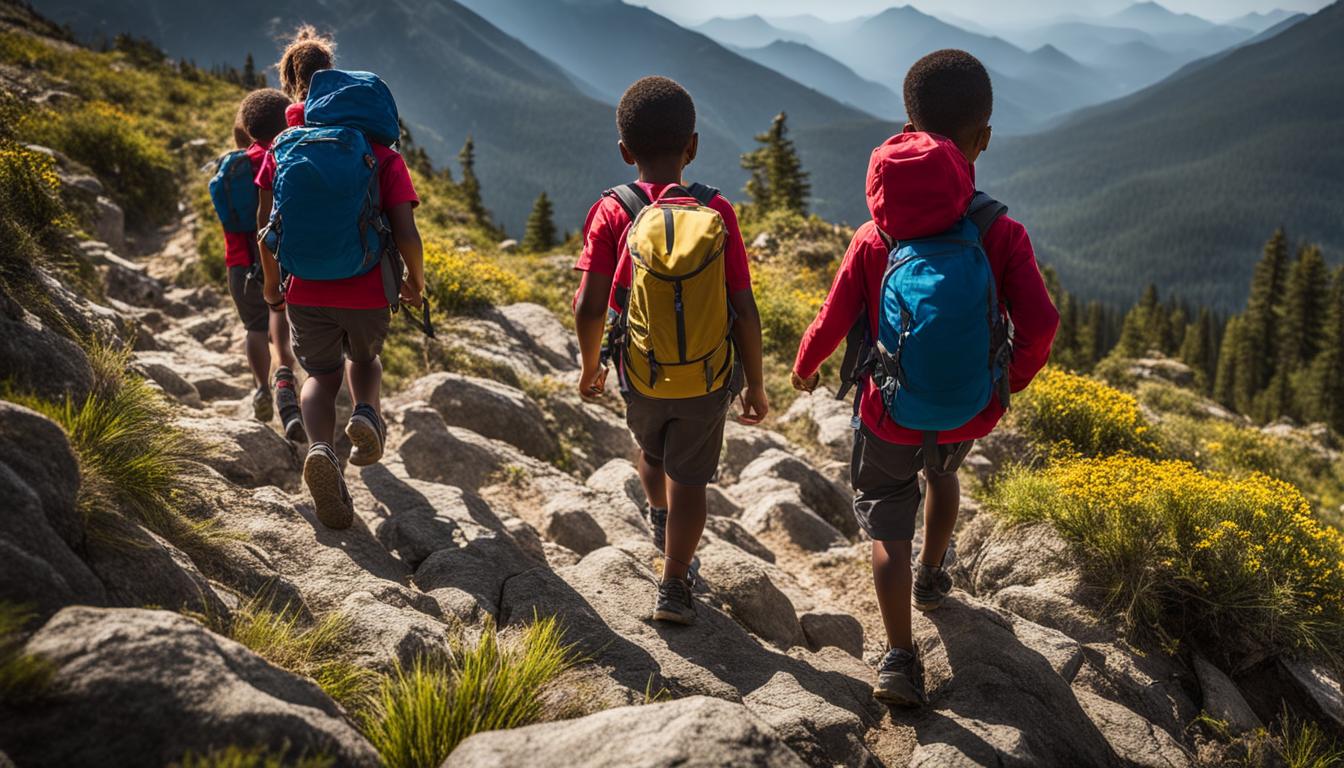Welcome to our article on the transformative power of nature and its impact on building resilience and problem-solving skills. Nature’s lessons provide us with valuable opportunities for personal growth and development, allowing us to tap into our innate abilities and overcome challenges. By embracing the great outdoors, we can embark on a journey of self-discovery and experiential learning that fosters a deeper connection with the natural world.
Outdoor learning adventures education serves as a bridge to enhanced development, offering a holistic approach that goes beyond traditional classrooms. Through hands-on experiences and direct interactions with nature, individuals can acquire invaluable skills such as problem-solving, critical thinking, communication, and teamwork. In this article, we will explore the various ways in which outdoor education promotes resilience, problem-solving skills, and overall personal growth.
Join us as we embark on a journey into the heart of nature’s teachings, discovering the secrets to building resilience and problem-solving skills outdoors.
Key Takeaways:
- Nature provides valuable lessons that foster resilience and problem-solving skills.
- Outdoor learning adventures education offers a holistic approach to personal development.
- Direct interactions with nature help individuals develop problem-solving, critical thinking, communication, and teamwork skills.
- Embracing the great outdoors allows for experiential learning and a deeper connection with the natural world.
- By exploring nature’s teachings, we can unlock our true potential for growth and overcome challenges.
Embracing the Great Outdoors for Resilient Youth
The impact of nature on young minds is undeniable. Spending time in the great outdoors not only promotes mental well-being but also shapes the resilience and problem-solving abilities of youth. Research shows that exposure to natural environments enhances creativity, problem-solving skills, and attention span.
When young individuals embrace the great outdoors, they have the opportunity to overcome adversity through environmental challenges. Outdoor activities provide a platform for them to develop grit, resilience, and valuable life lessons. Whether it’s navigating rugged terrains, conquering physical obstacles, or collaborating with peers to preserve the environment, outdoor experiences foster personal growth and self-discovery.
The Impact of Nature on Young Minds
Spending time in nature has a profound effect on the minds of young people. It enhances their mental well-being, reduces stress, and improves cognitive function. Studies have shown that exposure to natural environments can boost creativity, problem-solving skills, and attention span. The great outdoors provides a nurturing environment for youth to explore, learn, and develop valuable skills.
Overcoming Adversity Through Environmental Challenges
Outdoor activities and environmental challenges offer young individuals the opportunity to face and conquer adversity. Whether it’s trekking through challenging terrains, engaging in team-building activities, or participating in conservation initiatives, overcoming these challenges builds resilience and instills a sense of accomplishment. By navigating the environmental challenges, youth cultivate problem-solving skills, adaptability, and perseverance.
| Benefits of Embracing the Great Outdoors |
|---|
| Enhances mental well-being |
| Reduces stress |
| Improves cognitive function |
| Boosts creativity |
| Develops problem-solving skills |
| Fosters resilience and adaptability |
| Builds teamwork and collaboration |
Outdoor Learning Adventures Education: A Bridge to Enhanced Development
Outdoor learning adventures education is a powerful tool that goes beyond traditional classrooms, serving as a bridge to enhanced development. By providing hands-on experiences and direct interactions with nature, this unique approach to education fosters a range of valuable skills including problem-solving, critical thinking, communication, and teamwork.
Through outdoor learning adventures education, individuals have the opportunity to develop resilience, personal growth, and a deeper connection to the natural world. The transformative nature of outdoor education opens doors to new experiences and perspectives, strengthening cognitive abilities and nurturing holistic development.
Outdoor learning adventures education not only offers a break from the monotony of traditional classroom settings but also encourages active engagement and experiential learning. It provides a platform for individuals to explore their surroundings, ask questions, and learn from nature’s classroom. Immersed in the natural environment, students gain practical knowledge, develop a sense of curiosity, and grow into well-rounded individuals with a profound appreciation for the outdoors.
One of the key benefits of outdoor learning adventures education is the enhancement of problem-solving skills. In nature, individuals encounter unique challenges that require them to think creatively, adapt to changing circumstances, and find practical solutions. The process of problem-solving outdoors promotes critical thinking and instills a mindset of resilience and perseverance that extends beyond academic achievements.
Furthermore, outdoor learning adventures education supports overall well-being, as it encourages physical activity, reduces stress, and inspires a sense of wonder and awe. The fresh air, sunlight, and natural surroundings provide a rejuvenating environment that nurtures mental and emotional health. The transformative power of nature on the human mind and body cannot be underestimated and should be embraced as an invaluable resource for learning and growth.
| Benefits of Outdoor Learning Adventures Education |
|---|
| Enhanced development of problem-solving, critical thinking, communication, and teamwork skills |
| Promotion of personal growth, resilience, and a deeper connection to nature |
| Practical knowledge gained through hands-on experiences and interactions with the natural environment |
| Cultivation of curiosity, creativity, and a sense of wonder |
| Support for overall well-being through physical activity and exposure to nature |
Overall, outdoor learning adventures education acts as a catalyst for enhanced development. By embracing the outdoors as a classroom, individuals can unlock their full potential, acquire valuable skills, and cultivate a deep appreciation for the natural world. This transformative educational approach offers a unique and holistic learning experience that prepares individuals for success in both academic and personal realms.
The Synergy of Wellbeing and Outdoor Activities
When it comes to our overall wellbeing, there is a powerful synergy that exists between outdoor activities and our mental health. Stepping out into nature, breathing in the fresh air, and surrounding ourselves with green spaces can have a profound positive impact on our well-being. Research has shown that engaging in outdoor activities can reduce stress, improve mood, and enhance our overall psychological well-being.
Supporting Mental Health with Fresh Air and Green Spaces
Spending time in nature allows us to escape the fast-paced, technology-driven world and reconnect with the simple beauty of the natural environment. The calming effect of fresh air and the soothing sights and sounds of nature help to alleviate the symptoms of stress and anxiety. Whether it’s a leisurely walk in the park or a challenging hike in the mountains, outdoor activities provide a much-needed respite from the daily pressures of life.
“In every walk with nature, one receives far more than he seeks.” – John Muir
- Green spaces have been proven to:
- Reduce cortisol levels, a hormone associated with stress
- Improve mood and self-esteem
- Enhance concentration and focus
- Promote relaxation and a sense of tranquility
- Boost creativity and problem-solving abilities
- Increases oxygen intake, improving brain function
- Boosts the immune system
- Improves sleep quality
- Provides a natural source of energy and vitality
By incorporating outdoor activities into our daily lives, we can prioritize our mental health and well-being, rejuvenate our spirits, and cultivate a greater sense of happiness and fulfillment.
Mitigating Nature Deficit Disorder Through Regular Outdoor Exposure
In our modern digital age, many individuals, especially children, are experiencing what has been coined as “nature deficit disorder.” This term refers to the negative consequences of reduced contact with the natural world. Lack of outdoor exposure and limited interaction with nature can have detrimental effects on our physical, mental, and emotional well-being.
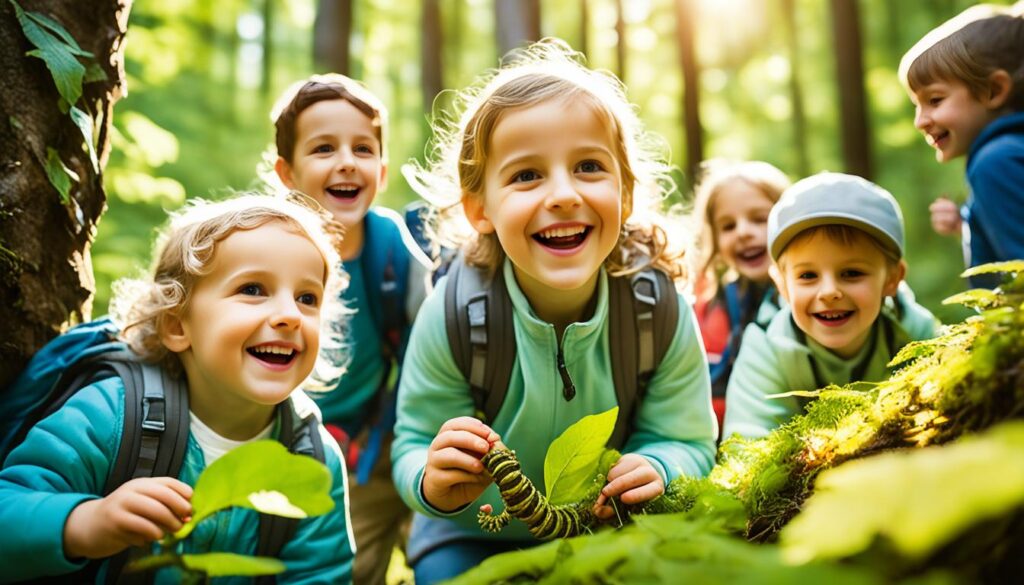
Regular outdoor exposure is essential for a healthy and balanced lifestyle. By immersing ourselves in the natural environment, we can combat nature deficit disorder and reap the benefits of outdoor activities. Studies have shown that spending time outdoors:
- Enhances cognitive function and attention span
- Promotes physical fitness and overall well-being
- Improves social skills and encourages teamwork
- Fosters a connection with the natural world and a sense of environmental stewardship
By prioritizing regular outdoor exposure for ourselves and our families, we can mitigate the negative effects of nature deficit disorder and cultivate a deep appreciation for the wonders of the natural world.
| Benefits of Outdoor Activities | Mental Health | Nature Exposure |
|---|---|---|
| Reduces stress | Improves mood and self-esteem | Enhances cognitive function |
| Increases happiness | Boosts creativity and problem-solving abilities | Promotes physical fitness and well-being |
| Alleviates symptoms of anxiety and depression | Enhances concentration and focus | Improves social skills and encourages teamwork |
Reimagining Education with Nature as the Classroom
In today’s rapidly changing world, there is a growing recognition of the need to reevaluate and reimagine traditional approaches to education. One innovative concept that is gaining traction is the idea of using nature as the classroom. By taking learning outside the four walls of a standard classroom, we can tap into the wealth of opportunities that the natural world provides.
Case Studies from Successful Outdoor Schools
Across the globe, outdoor schools have emerged as shining examples of the successful integration of nature-based education. These schools prioritize experiential learning and utilize the natural environment as a dynamic learning space. Through hands-on activities, outdoor exploration, and environmental stewardship, students in these schools develop a deep connection with nature and witness firsthand the relevance and applicability of their studies.
One notable case study is the Forest School approach, pioneered in Scandinavia and now gaining popularity worldwide. In Forest Schools, children spend significant portions of their time learning in natural forest environments, engaging in activities such as building shelters, conducting wildlife observations, and participating in team challenges. Research has shown that students in Forest Schools develop a love for learning, improved problem-solving skills, and greater self-confidence.
Another successful example is the Green School in Bali, Indonesia. Known for its innovative and sustainable approach to education, the Green School immerses students in a lush tropical setting, where they learn about sustainability, permaculture, and environmental activism. Through hands-on projects and community engagement, students develop a deep understanding of their role in preserving the natural world.
Integrating Experiential Learning into Standard Curricula
Integrating experiential learning into standard curricula is a crucial step in reimagining education with nature as an integral component. By combining hands-on experiences with traditional academic subjects, students gain a more comprehensive understanding of the world around them.
“Education is not the filling of a pail, but the lighting of a fire.” – William Butler Yeats
Experiential learning in nature allows students to apply theoretical knowledge to real-world contexts. For example, studying biology can be enhanced by observing and analyzing ecosystems first-hand, while history lessons can come alive through visits to historical sites and cultural landmarks. This integration of experiential learning not only deepens students’ understanding of academic subjects but also cultivates essential life skills, such as critical thinking, problem-solving, and collaboration.
As we reimagine education and explore new ways of engaging students, it is vital to include nature as an integral part of the learning journey. By embracing the transformative power of the natural world, we can create an educational experience that prepares students for success in the 21st century, fostering a deep connection to the environment and nurturing their holistic development.
The Role of Leadership in Outdoor Learning Initiatives
Effective leadership is crucial in driving successful outdoor learning initiatives. Leaders play a key role in creating supportive environments, fostering a culture of outdoor exploration, and providing the necessary resources for outdoor learning to thrive.
In outdoor learning initiatives, leaders serve as guides and facilitators, ensuring that participants have meaningful and engaging experiences. They inspire and motivate individuals to embrace the challenges and opportunities presented by nature, encouraging personal growth and the development of essential skills.
Strong leadership fosters a sense of community and collaboration, empowering participants to work together towards a common goal. Leaders create spaces where individuals feel safe to take risks, explore their boundaries, and learn from their mistakes.
Furthermore, leaders play a vital role in advocating for outdoor learning initiatives and securing support from stakeholders. They promote the value of outdoor education and its impact on the holistic development of individuals, both academically and personally.
Throughout the implementation of outdoor learning initiatives, leaders must demonstrate effective communication, problem-solving, and decision-making skills. They lead by example, modeling resilience, adaptability, and a deep respect for the natural world.
“Effective leadership is not about being in charge. It is about taking care of those in your charge.”
By fostering a sense of purpose and instilling a passion for outdoor education, leaders ignite the sparks of curiosity and a love for nature in individuals. They shape the future stewards of our planet, empowering them to be advocates for the environment and catalysts for positive change.
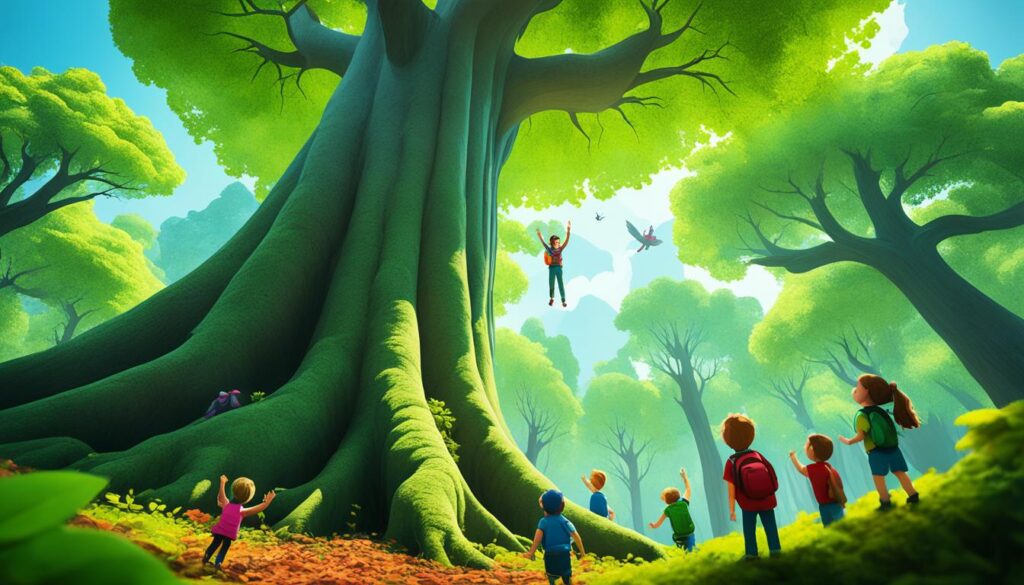
Nurturing Nature Education and Environmental Stewardship
In order to create a sustainable future, it is crucial to nurture nature education and instill a sense of environmental stewardship in individuals. By gaining knowledge and understanding from nature’s ecosystems and biodiversity, we can develop a deeper appreciation for the interconnections between different forms of life and recognize the impact of human actions on the environment. Nature education plays a vital role in fostering a generation of eco-conscious citizens who are equipped with the knowledge and values to protect and preserve our planet for future generations.
Learning from Nature’s Ecosystems and Biodiversity
Nature’s ecosystems are intricate networks of living organisms and their environment, functioning together in a delicate balance. By studying these ecosystems, we can gain valuable insights into the intricate relationships between plants, animals, and their surroundings. Understanding biodiversity – the variety of life on Earth – helps us appreciate the importance of preserving different species and their habitats. By learning from nature’s ecosystems and biodiversity, we develop a greater understanding of the interdependence of all living things and the need to protect and sustain these fragile systems.
Fostering a Generation of Eco-Conscious Citizens
The future of our planet depends on raising a generation of eco-conscious citizens who are committed to environmental stewardship. Nature education plays a pivotal role in cultivating a deep connection with the natural world and fostering a sense of responsibility towards its preservation. By engaging with nature through hands-on experiences, outdoor activities, and environmental education, individuals develop a profound sense of awe and appreciation for the Earth. This sets the foundation for eco-conscious decision-making and actions that contribute to a more sustainable future.
Adventure Education: Beyond Conventional Classroom Boundaries
Adventure education takes learning beyond the boundaries of the conventional classroom, offering a unique approach to personal and team development. In this section, we will explore the transformative nature of adventure education and its impact on personal growth and teamwork.
Expeditions and Wilderness Survival Skills
Expeditions and wilderness survival skills play a central role in adventure education. These experiences provide individuals with the opportunity to push their limits and develop resilience in the face of challenging and unfamiliar situations. By navigating the wilderness, acquiring essential survival skills, and overcoming obstacles, participants gain a sense of accomplishment and develop a deep sense of self-reliance.
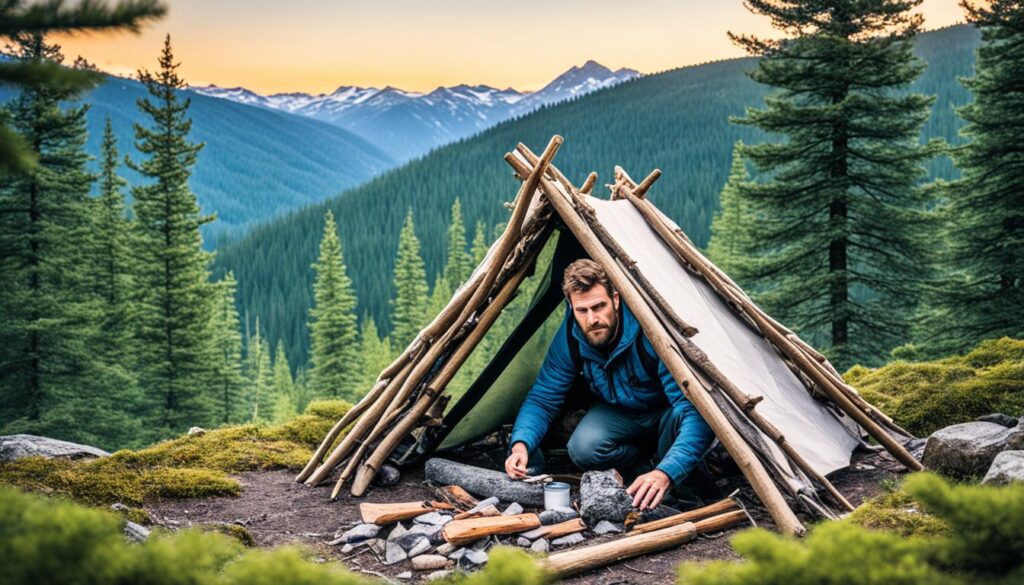
This hands-on approach to learning fosters personal growth and equips individuals with practical skills that can be applied in various contexts beyond the confines of the classroom. Whether it’s learning how to build a fire, navigate through dense forests, or set up a camp, wilderness survival skills provide individuals with the necessary tools to navigate the challenges of life with confidence and resilience.
Exploration as a Pathway to Self-Discovery and Teamwork
Exploration in nature serves as a powerful pathway to self-discovery and personal growth. By venturing into the unknown, individuals are provided with the opportunity to discover their true potential, challenge their limits, and gain a deeper understanding of themselves.
Adventure is worthwhile in itself.” – Amelia Earhart
Through outdoor expeditions and adventure activities, individuals develop a heightened sense of self-awareness, uncovering their strengths, weaknesses, and unique capabilities. This self-discovery journey not only promotes personal growth but also enhances teamwork and collaboration.
Adventure education emphasizes the value of teamwork and encourages individuals to work together towards a common goal. By engaging in shared activities, participants learn the importance of effective communication, cooperation, and mutual support. These collaborations in challenging outdoor environments foster a sense of camaraderie and trust among team members, providing a solid foundation for future collaborations in various settings.
In summary, adventure education offers a transformative approach to learning that goes beyond the boundaries of the conventional classroom. Through expeditions and wilderness survival skills, individuals develop resilience and self-reliance. Exploration in nature fosters self-discovery and personal growth while promoting teamwork and collaboration. Adventure education equips individuals with important life skills and prepares them to navigate the challenges of life with confidence and a deeper understanding of themselves and their place in the world.
Outdoor Skills Development: Equipping for Life’s Challenges
Outdoor skills development plays a pivotal role in preparing individuals to navigate life’s challenges with resilience and confidence. It goes beyond the realms of outdoor activities, offering a valuable toolkit of practical skills that are applicable to various aspects of life. Whether it’s acquiring survival skills to handle unexpected situations, mastering navigation techniques for adventure outings, or honing outdoor cooking abilities for camping trips, these skills are not just limited to the great outdoors. They translate into valuable life skills that empower individuals to overcome obstacles, adapt to new environments, and approach challenges head-on.
Through outdoor skills development, individuals cultivate problem-solving abilities, resourcefulness, and self-reliance. The process of learning and mastering outdoor skills builds confidence and fosters a sense of personal accomplishment. It encourages individuals to step out of their comfort zones, embrace new experiences, and develop a growth mindset that seeks continuous learning.
Furthermore, outdoor skills development nurtures resilience, teaching individuals how to persevere in the face of adversity. Outdoor environments often present unpredictable and demanding situations, requiring individuals to think on their feet, make quick decisions, and adapt to changing circumstances. These experiences build resilience and the ability to overcome obstacles, which can be applied to challenges in various areas of life.
Outdoor skills development also promotes physical fitness and an active lifestyle. Many outdoor activities require physical effort and endurance, helping individuals develop strength, agility, and overall fitness. Regular engagement in outdoor activities contributes to a healthy lifestyle, reducing the risks of sedentary behavior and related health issues.
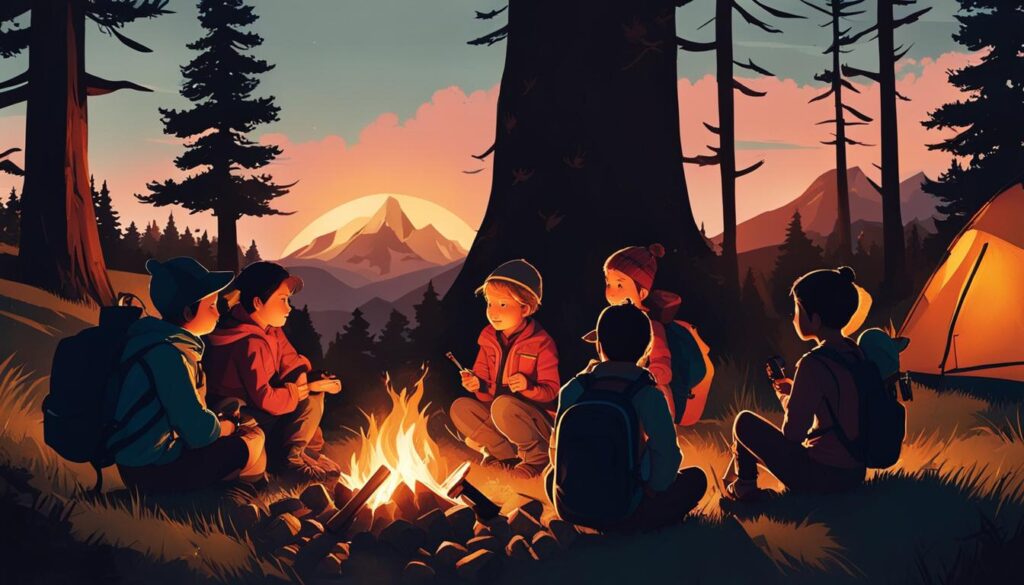
Overall, outdoor skills development equips individuals with the necessary tools to thrive in the face of life’s challenges. It instills resilience, fosters problem-solving abilities, and cultivates a mindset of continuous growth and learning. Whether it’s navigating through unfamiliar territory or cooking a meal over an open fire, the skills acquired in the outdoors empower individuals to embrace the unknown with confidence and tackle life’s challenges head-on.
Advancing Problem-Solving through Outdoor Exploration
Outdoor exploration provides an exciting opportunity to develop and advance problem-solving skills. By immersing ourselves in the natural environment, we can engage in real-world learning experiences that lead to tangible outcomes and practical solutions. The outdoor environment encourages risk assessment and critical thinking, challenging us to adapt, innovate, and overcome obstacles. Through these experiences, we foster a mindset of innovation and cultivate valuable problem-solving abilities.
One of the key benefits of outdoor exploration is the opportunity for real-world learning. Unlike traditional classroom settings, where learning can sometimes feel abstract, the outdoors provides a tangible context in which to apply knowledge. Whether it’s setting up a campsite, navigating through challenging terrain, or constructing a shelter, every task in the outdoor environment requires problem-solving and critical thinking skills. These real-world applications of knowledge provide a deeper understanding and enable us to see the tangible outcomes of our problem-solving efforts.
Risk assessment is an integral part of outdoor exploration. When faced with natural elements and unfamiliar situations, we must carefully evaluate risks to ensure our safety and well-being. This process of risk assessment not only cultivates responsible decision-making but also requires us to think critically about potential challenges and their solutions. Outdoor exploration provides a valuable opportunity to practice risk assessment in a controlled yet dynamic environment, sharpening our critical thinking skills in the process.
Critical thinking is an essential skill in problem-solving, both outdoors and in everyday life. In the outdoors, we often encounter unpredictability and uncertainty, requiring us to think critically and make informed decisions. By carefully analyzing information, evaluating options, and considering potential consequences, we can effectively address challenges and find innovative solutions. The outdoor environment serves as a catalyst for critical thinking, promoting a creative and adaptable approach to problem-solving.
Hands-On Learning: Touching the Texture of Knowledge
When it comes to education, hands-on learning experiences in the outdoors offer a unique opportunity for individuals to directly engage with knowledge and stimulate cognitive growth. Tactile experiences, such as feeling the texture of leaves or rocks, have been shown to enhance learning retention and deepen understanding. By actively participating in interactive outdoor learning activities, individuals are able to connect with concepts and ideas on a deeper level.
How Tactile Experiences Support Cognitive Growth
By incorporating tactile experiences into learning, individuals are able to activate multiple senses, leading to a more comprehensive understanding of the subject matter. When we touch and feel objects in nature, our brains make neural connections between the tactile sensations and the information being learned. This multisensory approach to learning promotes cognitive growth by stimulating different areas of the brain and enhancing memory retention.
Tactile experiences also foster a sense of curiosity and exploration, encouraging individuals to ask questions and seek answers. When we physically interact with our environment, we become active participants in the learning process and develop a deeper appreciation for the natural world.
Interactive Outdoor Learning Activities and Their Educational Impact
Interactive learning activities in nature provide an immersive and impactful educational experience. Outdoor classrooms offer a diverse range of interactive activities, such as scavenger hunts, nature journaling, and hands-on science experiments. These activities not only engage students on a cognitive level but also promote critical thinking, problem-solving, and teamwork skills.
Through interactive learning activities, individuals have the opportunity to apply theoretical knowledge to real-world situations, bridging the gap between theory and practice. This hands-on approach to education fosters deeper comprehension and a greater sense of ownership over the learning process. As a result, individuals develop a lifelong love of learning and a passion for exploring the world around them.
In conclusion, hands-on learning experiences in the outdoors provide a rich and engaging educational environment. Tactile experiences support cognitive growth by enhancing learning retention and promoting a multisensory approach to knowledge acquisition. Interactive outdoor learning activities have a profound educational impact, fostering critical thinking, problem-solving, and teamwork skills. By embracing hands-on learning and interactive activities in nature, we can unlock the full potential of education and pave the way for a brighter future.
Conclusion
In conclusion, outdoor learning adventures education offers a multitude of benefits. By embracing outdoor education, individuals can develop resilience, problem-solving skills, personal growth, and a deep connection with nature. Outdoor experiences provide a transformative power that enhances overall well-being and promotes a sense of harmony with the natural world.
It is crucial to encourage continued growth and exploration in the realm of outdoor learning. The potential for personal and educational development is immense. By engaging in outdoor activities, individuals can continue to discover new perspectives, learn valuable life lessons, and expand their knowledge and skills.
So let us embrace the wonders of outdoor learning adventures education and unlock the full potential of our resilience, problem-solving abilities, personal growth, and connection with nature. Let us continue to explore, discover, and grow, ensuring that nature remains a vital part of our education and our lives.
FAQ
What benefits does outdoor learning offer to young people?
Outdoor learning offers numerous benefits to young people, including the development of resilience, problem-solving skills, and a deeper connection with nature. It enhances mental well-being, reduces stress, and improves cognitive function.
How does outdoor education promote personal growth and development?
Outdoor education fosters personal growth by providing hands-on experiences and direct interactions with nature. It helps individuals develop skills such as problem-solving, critical thinking, communication, and teamwork. It also cultivates a deeper connection with the natural world.
What is the impact of outdoor activities on mental health?
Outdoor activities have a profound positive impact on mental health. They reduce stress, improve mood, and enhance overall psychological well-being. Regular outdoor exposure can also help mitigate nature deficit disorder.
How do outdoor schools integrate nature-based education into the learning experience?
Outdoor schools provide real-life case studies that demonstrate the benefits of outdoor learning. They show how it positively impacts students’ academic performance, personal growth, and overall well-being. These schools integrate experiential learning into standard curricula.
What role does leadership play in promoting outdoor learning?
Leadership is crucial in driving successful outdoor learning initiatives. Effective leaders create supportive environments, foster a culture of outdoor exploration, and provide the necessary resources for outdoor learning to thrive.
How does nature education contribute to environmental stewardship?
Nature education instills a sense of environmental stewardship by teaching individuals about ecosystems, biodiversity, and the impact of human actions on the environment. It fosters a deeper understanding of the interconnections between life forms and encourages eco-conscious behavior.
How does adventure education go beyond the traditional classroom?
Adventure education takes learning beyond the boundaries of the conventional classroom. Expeditions and wilderness survival skills provide opportunities for individuals to push their limits, develop resilience, and discover their true potential. Outdoor exploration fosters self-discovery and teamwork.
What are the benefits of outdoor skills development?
Outdoor skills development equips individuals with the tools to navigate life’s challenges with resilience and confidence. These skills go beyond outdoor activities and translate into valuable life skills such as survival skills, navigation techniques, and outdoor cooking abilities.
How does outdoor exploration enhance problem-solving abilities?
Outdoor exploration offers a unique platform for advancing problem-solving skills. Real-world learning experiences in nature provide practical solutions to complex problems. Outdoor environments encourage risk assessment, critical thinking, adaptation, innovation, and overcoming obstacles.
How do hands-on learning experiences in the outdoors contribute to cognitive growth?
Hands-on learning experiences in the outdoors stimulate cognitive growth by allowing individuals to actively engage with concepts and ideas. Tactile experiences enhance learning retention and deepen understanding.
Source Links
- https://education.gov.scot/media/rvdfwele/learning-outdoors.pdf
- https://ltl.org.uk/news/5-key-benefits-of-outdoor-learning/
- https://silvotherapy.co.uk/articles/resilience-through-nature-connection

